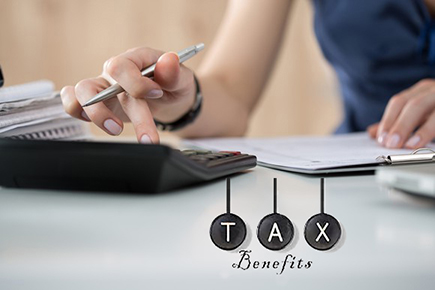Reap the Tax Benefits of Homeownership!
3.8.17
Homeowner’s association fees, property taxes, and the cost of unforeseen repairs are all worries new homeowners have when it comes to their finances. Good news, though! There are tax benefits to home-ownership that many homeowners do not think of.
Mortgage Interest Deduction
Homeowners can deduct the interest paid on their mortgage. This has the potential to be a huge tax saving. Initially, much of your monthly mortgage payment goes towards interest. Your mortgage company can help you figure out how much of your monthly payment goes towards interest and how much goes towards the principal on the loan. Once you know the monthly interest, you can then claim this as a deduction when you file your taxes.
Property Tax Deduction
If you pay taxes on your property, whether it is your primary residence or even a vacation home, the property taxes can count as a deduction towards your taxes. This could be a considerable amount depending on how much your property taxes add up to.
Possible Closing Cost Deductions
If you’ve closed on a home in 2016 and you are a first-time home buyer, you can claim the closing costs on your taxes at the end of the year. You do have to meet all of those previously listed qualifications so, if you are not a first-time home buyer, you will not be able to claim those closing costs. The good news is that if you are a first-time home buyer, regardless of whether the closing costs are paid by you or the seller, you can still claim them. This could mean a sizeable amount as the usual down payment on a home is 1% or more of the house sale price.
Home Equity Lines Deduction
Many homeowners are aware that they can claim the interest they have paid on their home during the previous year. Homeowners are unaware that they can also claim the interest they paid on a home equity loan during the previous year. If you took out a home equity loan to help consolidate debt or for any other reason, don’t forget to claim the interest paid on that home equity loan.
Exclusion for Capital Gains
If you have lived in your home for over 2 years, you can qualify for this exclusion. Have you sold your home and earned money off the sale? Then the profits are tax exempt as long as they are less than $250,000 if you are single, and less than $500,000 if you are married.
Use Your Tax Refund For A Down Payment On A New Home
In addition to these tax benefits, now may be the perfect time to use your tax refund for a down payment on a home! According to finance.com the average tax refund from 2016 was $2,800. This is a considerable amount to help towards a down payment. The market this time of year is usually great for either buying or selling, which means you should have many homes to choose from. Why not take advantage of the tax refund you receive and put it towards a down payment on a new home?


